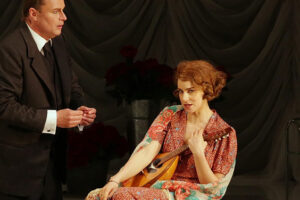

For one thing, like so many musicians of that age and artists of any, he created by theft. The hoard that he would burgle in order to raise himself to world esteem was his own work, and that did not yet exist! Time was a-wasting! He had composed only eight operas. Many more would be required, if only so that they could be dissected, disemboweled and re-stitched by Rossini’s celebrated heir and protégé: himself.
It was under these circumstances that Opportunity Makes the Thief (L’Occasione fa il ladro) appeared in the fall of 1812. The piece is a farsa, skit, a curtain raiser—the rest of the evening could be filled out with another opera or two, a grand ballet, a play, a recital. L’Occasione is thus an odd choice as a standalone outing, even for The Little Opera Theatre of New York, a company that specializes in short works but sometimes bunches them up to stretch an evening. L’Occasione all by its lonesome lasts 85 minutes. It is double-cast and sung in English at 59 E 59 through March 2.
The plot is ancient and survived into screwball Hollywood: Don Parmenione, a nobleman rich only in debts, happens to swap suitcases at an inn during a storm. The other valise belongs to Count Alberto, en route to Naples and Berenice, his adored, wealthy fiancée. True, he has never seen her, but then she has never seen him either. A perfect match! Parmenione sneaks ahead to woo her himself.
But, just as you’d expect, the lady has persuaded her chum, Ernestina, to switch identities with her to find out if the unknown suitor loves her beauty or her money. (Or perhaps her luggage.) Cast includes a snarky servant and a bewildered uncle. The orchestra under James Bagwell consists of eight musicians, and I wish they played as elegantly as they are costumed: some whiny strings here. (Lara de Bruijn did the costumes.)
There are a few extravagant solos and there are duets in which one character sings a melody and the other sings staccato in a contrasting register. There is a pretty quintet that lacks, however, the demented concertato gimmicks with which Rossini would conquer the world. All the ingredients are ready for the Tornado Rossini, but the chef still awaits the perfect viande. The very next year brought melodramatic Tancredi and comic L’Italiana in Algeri, and then Rossini was as famous as he cared to be. With L’Occasione, we are on the brink of glory but not there: The characters lack individuality.

Joseph Flaxman, the Parminione, plays the handsome scoundrel with just the right look of invincible conceit, but his baritone is on the hollow side, and produces dry, not exactly tuneful notes. This was easy to overlook when he was singing staccato against another singer’s flowing line, as (in Rossini) one often does. Matthew Singer did all that might be required as the servant and John Kapusta, looking far too young to be Berenice’s uncle, sang very little but gracefully channeled Edward Everett Horton in every scowl and pratfall.
The jokey staging by Philip Shneidman skips nimbly by without overly hammered slapstick. The sung translation by Mark Herman and Ronnie Apter (ably pronounced by the whole cast) made more use of assonance than genuine rhyme, but its clarity and observance of verse form are a happy change from last year’s outing. The piece is charming, but brief. Little Opera Theatre might easily have filled the evening by adding (or curtain-raising) a second farsa or intermezzo with the same cast and barely any costume adjustment. There are scads of such pieces, by Rossini, Paisiello, Gluck, Pergolesi, Scarlatti, Salieri, Hasse and fifty others. Even with two decent coloraturas and a supple tenor, 85 minutes left me feeling underfed.
Photos: Tina Buckman
























Comments